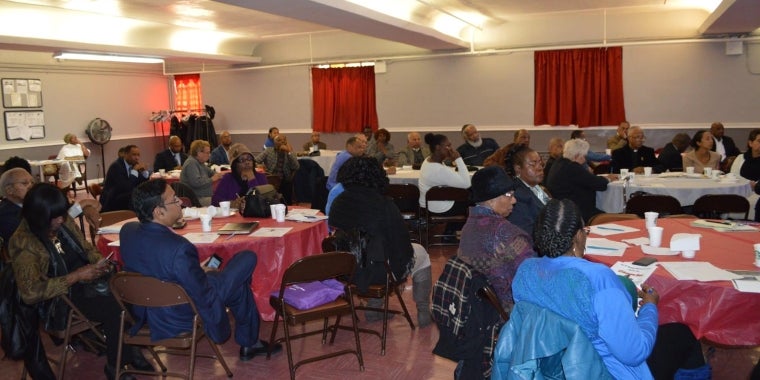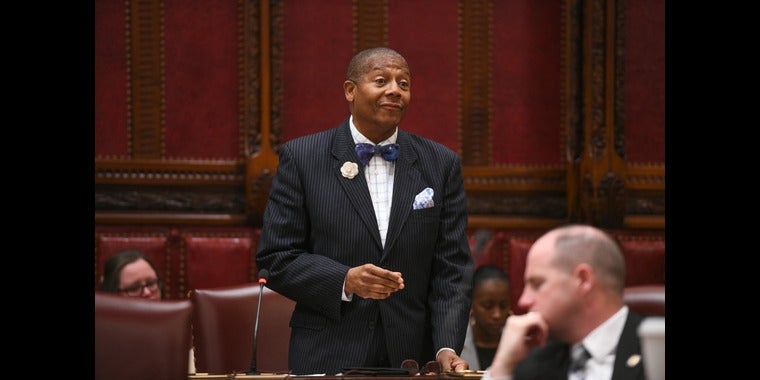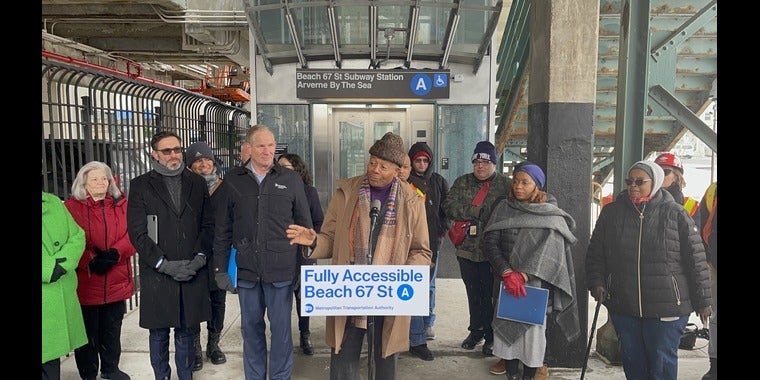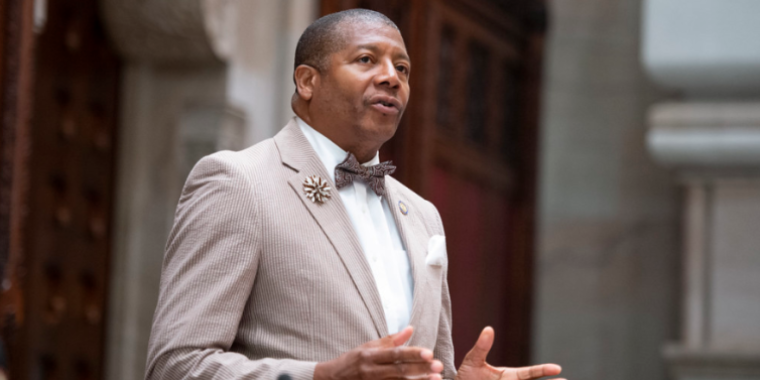
Sanders Hosts Clergy Breakfast on Improving Police / Community Relations
October 28, 2016

State Senator James Sanders Jr. (D-Rochdale Village, Far Rockaway) today held his monthly Community Clergy Breakfast at Calvary Baptist Church in Jamaica where the topics of discussion were law enforcement reform and improving police / community relations. It was a continuation of last month’s discussion on the same topics, which featured representatives from the NYPD.
“Some of the most important issues we face today involve the policing of our community and how we interact with police officers,” Sanders said. This morning we are going to have a much needed conversation about some of the injustices that exist and how we can change the process.”
This month the guest speakers were Amol Sinha, State Policy Advocate at the Innocence Project, a group that helps exonerate wrongly convicted people through DNA testing, and Robert Ganji, Director of the Police Reform Organizing Project (PROP), who spoke against the quota driven, broken windows policy of policing, which he said is ineffective and unfairly targets communities of color. There was also a brief presentation by Zaleika Johnson of NHS Development Corporation, who discussed how the organization can assist residents in finding affordable housing.
Sinha said the Innocence Project focuses on two core areas – litigation and policy work. Since it was founded in 1992, the Innocence Project has exonerated 347 people through DNA testing, where results had either ruled out the convicted person as the perpetrator or were inconclusive. The group also advocates for reform of the criminal justice system and greater oversight and accountability of law enforcement.
Sinha noted several key areas where changes could be made to reduce wrongful convictions. One way is through eyewitness identification reform. In over 71% of Innocent Project cases, the misidentification of a person alleged to have committed a crime contributed to the conviction. Witnesses are usually asked to select a perpetrator from a line up, photo array or in-person at the crime scene. This method is flawed, Sinha said, because one’s memory can be unreliable especially following traumatic events, and because memory relies on perception, is selective and can be contaminated by fear, media reports, the passage of time, and other circumstances.
The Innocence Project is also calling for several other reforms including blind administration of a line up, meaning that the police officer conducting the procedure should not know who the suspect is ahead of time. This would prevent any bias influencing of the witness, Sinha said. Also, pictures featured in photo array identifications should include adequate fillers – non-suspects who look similar to the suspect. There should also be uniformed instructions, letting the victim know that the suspect may or may not be in the lineup, so they are not compelled to have to make a decision. The police should also let the victim know, Sinha said, that whether he or she makes a positive identification or not, the investigation to find the perpetrator will continue.
The Innocence Project also recommends that immediately after an eyewitness identifies a perpetrator, law enforcement should take a confidence statement from that person – asking how confident he or she is in their selection. In addition, they are advocating for the complete video recording of custodial interrogations. Sinha said that in 1/3 of Innocence Project cases, a false confession played a part in the wrongful conviction. Sinha explained that video footage can be used to determine whether a suspect’s answers have been coerced, whether there is real or perceived intimidation, the use of force, and whether the suspect understands the situation. The latter can be affected by things such as a person’s mental health, exhaustion, hunger, substance abuse or a language barrier.
In continuing the discussion of law enforcement practices, Robert Ganji, Director of the Police Reform Organizing Project, a group whose mission is to create awareness about what it considers “the current wasteful, unequal, and racially-biased police activity in New York City and throughout the country,” spoke about the dangers of the Broken Windows theory of policing. It hypothesizes that by preventing and punishing minor offenses like vandalism, public drinking and toll jumping, it creates an atmosphere of law and order in a community, thereby preventing serious crimes like murder, assault, rape and robbery.
Ganji contends that the NYPD, operating with the Broken Windows theory in mind, combined with placing quotas on its police officers to demonstrate productivity, creates a racially biased system that unfairly targets low-income people of color. Ganji cited several pieces of data to support his argument, including noting that in 2015, some arrest categories involved people of color at a rate of over 90%. They consisted of minor infractions such as theft of services (primarily toll jumping), the possession and sale of marijuana, and trespassing.
“The quota system is an incentive for bad policing,” Ganji said.
PROP is calling for fundamental changes that would affect policing on a daily basis, such as abandoning Broken Windows, abolishing the quota system, and refocusing policing on serious crimes instead of responsibilities that could be handled by other city agencies – responsibilities such as traffic enforcement, the regulation of street vendors, school safety, cases of mental distress and homelessness, and the sale of untaxed goods like loose cigarettes.
Senator Sanders' Community Clergy Breakfasts are aimed at educating clergy and giving them the tools and information they need to help themselves and their congregations.
We would like to thank local business owner Ann Narine for sponsoring this month’s breakfast and Calvary Baptist Church for allowing us to use their space to host the event.
Share this Article or Press Release
Newsroom
Go to NewsroomSenator Sanders Honors Dr. Martin Luther King's Legacy
January 19, 2024



